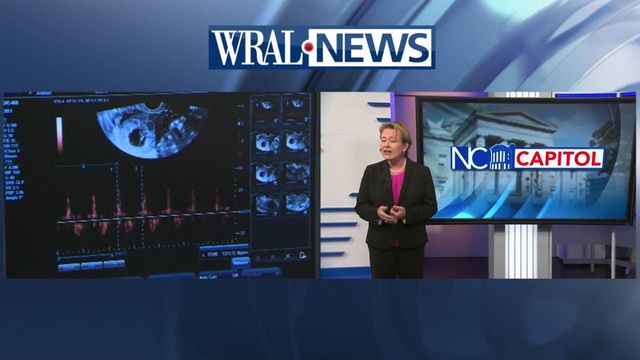GOP thinks it has the votes to override veto of NC abortion bill
Republican leaders in both chambers of the General Assembly predict a swift override Tuesday in the first test of the party's supermajority.
Posted — UpdatedRepublican leaders in the GOP-controlled North Carolina legislature think they have the votes to override Democratic Gov. Roy Cooper’s veto of a controversial bill restricting abortion access in the state. That appears to include the support of four moderate Republicans Cooper sought to cajole into siding with him.
Both chambers plan to vote on the override Tuesday — three days after Cooper rejected the bill during a rally across from the General Assembly building in downtown Raleigh.
Republicans maintain a narrow veto-proof majority in both chambers of the General Assembly. If one Republican in either chamber votes to support the veto, the bill, Senate Bill 20, fails to become law. The bill would reduce the cutoff for many abortions from 20 weeks to 12 and add other restrictions to women seeking abortions and clinics seeking to provide them.
On Monday, House Speaker Tim Moore’s communications director, Demi Dowdy, said Moore expects the full House GOP caucus to vote in favor of the effort.
On Saturday, Senate Leader Phil Berger, R-Rockingham, said in a statement: “I look forward to promptly overriding his veto.” Berger doesn’t typically forecast the outcome of votes unless he has high confidence in the outcome.
The comments suggest that Cooper may have failed to persuade one Republican to support his cause.
Cooper spent last week crisscrossing the state meeting with doctors and clinic operators while applying pressure to moderate Republicans who have made statements supporting looser limits on the procedure. Among the Republicans Cooper has targeted: Reps. Tricia Cotham, John Bradford and Ted Davis and Sen. Michael Lee.
Cotham, Bradford and Lee have given indications that they would vote to override Cooper’s veto. The question mark has been on Davis, who said during his 2022 campaign that he opposed efforts to further restrict abortions. He more or less kept that promise when he skipped the vote on the GOP’s bill when it first passed the House.
Dowdy’s statement suggesting Moore has his party’s full support in the House indicates that Davis would support the override.
Davis has declined to say what he might do when the override vote comes up. He didn't immediately respond to a request for comment on Monday.
During a forum for Wilmington-area candidates last year, Davis pushed back on a suggestion that GOP leaders might be able to change his position on abortion, saying Moore “doesn’t tell me what to do. … I’m going to vote to keep it just the way it is.”
The Senate is scheduled to vote first on the override Tuesday. If the motion passes that chamber, the House would vote soon after.
Conservative groups have decried Cooper’s veto. N.C. Values Coalition Executive Director Tami Fitzgerald said in a statement that the veto "would crush provisions to give women more opportunities to choose life, improve safety standards of clinics, and stop the barbaric painful practice of partial birth abortion."
The Catholic Dioceses of Charlotte and Raleigh said in a statement on Monday: “While this bill is not perfect, we hope it will become law to advance protection for unborn children and support for mothers in need.”
Cooper says the restrictions go against what most North Carolinians want. The state Republican Party, however, thinks the general public supports its plan. The state party’s spokesman, Jeff Moore, told WRAL News last week: “Despite the governor's rhetoric, this proposal is well within the mainstream of public opinion and we look forward to an override of his promised veto.”
The bill represents a compromise in a GOP caucus that has maintained wide ranging views on the issue, including members favoring everything from a full abortion ban to keeping the laws the same.
It takes North Carolina's current ban on abortions after 20 weeks — with exceptions for medical emergencies — and moves that to the 12 week mark. The ban would kick in later in cases of rape or incest (20 weeks) or life-limiting fetal abnormalities (24 weeks). Abortion would stay legal any time a doctor declares a medical emergency.
Other aspects of the bill would make it more onerous for women, and particularly poor women, to get an abortion at any time, critics say. A phone consultation required by current law at least 72-hours before an abortion would have to be held in person under Senate Bill 20, and the bill also adds a post-abortion doctor's appointment as well.
The spaced-out appointments will be difficult to keep, Democrats have argued, for women with full-time jobs, women with other children to care for and women who don't have money for travel. There are only 14 abortion clinics in North Carolina, located in nine of the state's 100 counties.
Abortions must be performed at a clinic or a hospital, and Democratic lawmakers said 20 North Carolina counties don't have a hospital.
The bill also calls for new clinic licensing rules for clinics. There's some dispute just what the bill requires here, but Planned Parenthood, which operates six of the state's 14 clinics, has said none of its facilities meet the expected new regulations and would either have to close or upgrade at unknown costs.
Doctors groups have complained about new paperwork and reporting requirements in the bill, which they say are not medically necessary.
Related Topics
• Credits
Copyright 2024 by Capitol Broadcasting Company. All rights reserved. This material may not be published, broadcast, rewritten or redistributed.






